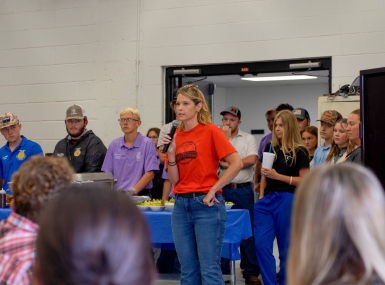Coal counties talk economic diversification

A group of county and regional leaders convened in Pike County, Ky., in late April, bound by a common interest in finding new ways to grow their economies. Based in communi ties that have long been reliant on the coal industry, these leaders came together to share ideas and learn about innovative strategies to create jobs and improve quality of life through changing economic times.
NACo hosted this workshop in Pikeville from April 22 24 as part of a larger effort to support communities seeking to diversify their economies and create jobs. Known as the In novation Challenge for Coal-Reliant Communities, the effort centers on three workshops, the first of which was held in Pikeville.
Prior to the event, teams from counties in eastern Kentucky, south west Virginia and West Virginia and Moffat County, Colo. were asked to think through their goals for the workshop and outline the biggest challenges they face, which they presented on the first day of the event.
Number one among the chal lenges listed? Jobs. Everyone voiced concerns about how contractions in the coal industry has meant fewer local jobs, which in turn has affected small businesses and the local tax base, and has led to population loss. The loss of young people was a particular issue brought up repeatedly.
In response, keynote speakers and panelists highlighted the importance of embracing diverse leaders to foster economic growth and community prosperity.
"Rural places must build collab orative leadership networks and em brace current demographic changes: engage younger, more diverse leaders and make sure you get more women into leadership roles, " said Chuck Fluharty, president and CEO of the Rural Policy Research Institute. He also noted that economic growth and community cohesion can not be achieved without addressing social equity.
Similarly, Kelly Ryan, president and CEO of Incourage Community Foundation, directed counties and regions in coal country to envision diverse, collaborative leadership networks in their regions, and to bring those values into their own organizational structures.
During a panel discussion, par ticipants considered how to cultivate pride and ownership in their com munities, as well as how to encourage residents and business owners to embrace change.
Commissioner Matt Wender of Fayette County, W.Va. said "It's amazing what you can do as a com munity if you don't worry about who gets credit for it."
Peter Hille, another panelist and president of the Mountain As sociation of Community Economic Development in Berea, Ky., reassured participants that "the greatest chal lenge every community faces is getting people to work together."
Participants learned about eco nomic diversification and community leadership strategies via general ses sion presentations and small group dialogues on specific topics such as entrepreneurship, broadband development and workforce training. In between those sessions, teams mapped out their short-term goals and paths for achieving those goals in the next 100 days, known as their "Implementation Roadmaps."
As participants strategized action steps, several themes quickly emerged: strategies to help coal miners find work were paramount, as were ways to bolster job opportunities for young people so they can remain in their communities.
Participants also brainstormed ways to build an entrepreneurial culture in their communities, support small business growth, nurture grow ing industries and leverage broadband infrastructure.
Josh Barnes of EDA spoke with the group to explain the Obama Administration's new POWER Initiative (see sidebar), and Jared Arnett, executive director of Shaping Our Appalachian Region (SOAR), discussed how these efforts could integrate with SOAR, a new regional initiative to expand job creation and enhance regional opportunity in Appalachian Kentucky.
At the close of the workshop, each team presented its Implementation Roadmap and explained how this event would enable them to expand and deepen economic development efforts upon returning home.
Sandi Curd, Promise Zone coor dinator for the Kentucky Highlands Investment Corporation, speaking on behalf of Harlan County, Ky. said, "We've been having lots of commu nity forums in Harlan County, so there is a lot of listening happening, but with this workshop we want to take tangible ideas back to the community and get their input and ownership, and find out who it is that wants to move these into action."
Erik Pages of Entreworks Con sulting, served as the workshop fa cilitator and highlighted the progress each team made. "The introductory presentations on day one had many similarities, but now these closing pre sentations speak very specifically to their economic diversification goals."
The five-county area around Pikeville set goals to collect and ana lyze data to map assets and identify clusters in their region, while the adjacent counties to the north laid out plans to work with stakeholders in the region's downtown areas to come up with ways to reinvest in historic centers.
Clif Moore, county administra tor for McDowell County, W.Va., reminded participants of why this work is so important: "We are about restoration, transformation, leader ship, wisdom and hope. Remember that."
The workshop was hosted in partnership with the U.S. Eco nomic Development Administration (EDA) and the National Association of Development Organizations (NADO) Research Foundation,
In conjunction with the event, NACo has also unveiled a new Web portal, Resources for Transitioning Economies at www.diversifyeconomies. org. The website is stocked with free tools, reports, case studies and other resources available to any county, community or region seeking to diversify and strengthen its local economy.
Later this year, NACo and NADO will host two more work shops. Counties and regions that are economically linked to the coal industry are invited to form teams to apply to attend a workshop and access pre- and post-workshop support.
Short-term planning assistance available to coal-impacted counties
The U.S. Economic Development Administration (EDA) has announced the availability of $3 million in planning assistance to communities impacted, or which may be impacted, by contrac tions in the coal economy. These funds are made available as part of the Partnerships for Opportunity and Workforce and Economic Revitalization (POWER) Initiative, a new interagency effort to assist communities negatively impacted by changes in the coal industry and power sector. For more information about how to apply,visit www.eda.gov/power .
Attachments
Related News

Chamber of commerce program helps keep workers on the job
Audrain County, Mo.'s Workforce Resource Assistance Program has helped employers keep staff in place, reducing turnover and promoting stability.

County leadership guides shared prosperity
There’s no chicken-or-egg debate: Economic mobility is not just a byproduct of growth — it is the result of intentional county governance.

Inland port offers opportunity for Hertford County, N.C.
Hertford County, N.C. doesn’t have a lighthouse, but that hasn’t stopped its economic future from shining thanks to what became known as Project Green Lantern.
